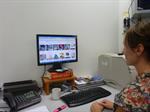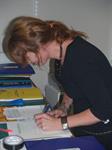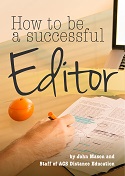
PROOFREADING AND EDITING ONLINE COURSE
This certificate is designed to provide the knowledge and skills to work as a freelance editor or proofreader, or for those seeking employment as such in the media.
You will be mentored by a team that includes many experienced media professionals - journalists, authors and editors - led by our Principal, John Mason, a former editor for four national magazines.
Save
Modules
Note that each module in the Qualification - Certificate in Editing and Proofreading is a short course in its own right, and may be studied separately.
What's Covered in the Modules
EDITING I
 This course contains eight lessons as follows:
This course contains eight lessons as follows:
- Introduction to Editing
- the nature and scope of editing
- what an editor does
- tools for editing
- editing skills; the things that make a good editor
- danger signs (mistakes to avoid)
- the publishing team (the publisher, business manager, production manager, designer, marketing staff)
- the production process
- the production schedule
- The Mechanics of Clear Writing
- spelling
- punctuation
- grammar
- language
- style
- tense
- language level
- common mistakes
- style errors
- improving clarity and conciseness
- Assessing Manuscripts
- the readers report
- reviewing a manuscript (structure, punctuation, accuracy, illustration, other improvements),
- authors responsibilities
- nature of a manuscript
- libel, slander, deformation
- what an editor should look for
- Copy Editing I
- what the copy editor does
- basics of copy editing
- the procedure (check manuscript, read, edit text, edit other components)
- style sheets
- house style
- introduction to mark up
- marking up copy
- Copy Editing II
- marking up
- parts of a publication (preliminary pages, text, end matter)
- editing non-text material
- illustrations
- Preparing Copy for Printing
- type design and page layout
- type size
- type face
- line spacing
- line length
- justification
- indentation
- windows and orphans
- running heads and feet
- folios
- headings
- proof stages: galley proofs, page proofs
- Proof Reading
- proofreaders role
- procedure for checking galley proofs
- proofreading tips
- revised galley proofs
- The Final Stages
- indexes
- prerparing an index
- blurbs
- checking final proofs
- bromides, dyelines, etc.
 EDITING II
EDITING II
There are eight lessons in this module as follows:
1. Introduction to Editing -State of the Art
2. Editing and Design
3. Headings, Headlines and Captions
4. Graphics
5. Refining Text Exiting - Common Traps
6. Matching Style and Context
7. Legal and Ethical Issues
8. Editing Project
 EDITING PRACTICE
EDITING PRACTICE
This is a unique, hands-on course that develops your practical skills to edit professionally. The course takes you through the processes of editing for a specific publication, submitting work for publication, and meeting the requirements of an editor and publisher.
-
Working to Specifications
-
Editing Articles for Online Publications
-
Submitting Articles for Online Publications
-
Preparing and submitting Layout for publication
Under the guidance of a mentor (a writing/editing tutor), you will learn to edit according to specific criteria, deal with a publisher, and communicate effectively with others involved in the publishing process.
GRAPHIC DESIGN
The course is divided into 10 lessons as follows:
1. Scope and Nature of Graphic Design
2. Design Fundamentals - line, tone, colour, etc.
3. Colour Theory and Applications
4. Typography
5. Illustration - methods & techniques
6. Logotype Design
7. Layout Design
8. Design Systems and the Design Industry - design briefs, how to bid for jobs, etc.
9. Comparative Design - lessons from other designers
10. Design Project - a practical project applying what you have learnt

ELECTIVES
These are designed to build extra skills which compliment the job of an editor, in areas such as writing and research. A range of options are offered, to provide students the change of persuing areas of specific relevance or interest to them. This way every student can build a slightly different set of skills, differentiating themselves from others in industry, and allowing them to develop a reputation as a "specialist" fulfilling a niche.
Working as an Editor
Editing has always required specific skills. “Highly developed written and verbal communication skills”, “an eye for detail”, “a logical and enquiring mind”, “an ability to meet deadlines”, “a comprehensive knowledge of publication processes” are just some of the skills required in the editing profession.
Today’s editors still need those important foundation skills but, with the advent of computer technology and in the face of increasingly competitive markets, editors must be prepared to diversify, and to acquire a new range of skills. Although today’s editors are still expected to review manuscripts, mark up copy, check proofs, and liaise with writers, printers and publishers, they may also be expected to be highly proficient in a whole range of areas that didn’t exist a decade or two ago.
The minimum ‘new’ skill required by all editors is computer proficiency, mainly in the use of Microsoft Word, email programs and Internet searches, but possibly also in desktop publishing software such as QuarkXpress, Adobe PageMaker, Adobe Illustrator and Photoshop. Editors involved in marketing and sales may also use accounting and spreadsheet software.
Text and graphics, previously supplied as ‘hard copy’, are now submitted as ‘electronic manuscripts’, making the job of editing both easier and more complex. Easier because text does not need to be marked up on a hard copy and rekeyed by a typesetter; harder because the editor and designer have taken over the task of typesetting.
In most cases editors are not directly involved in pre-press design, and would not be expected to be proficient in the use of complex DTP software – in quality publishing this is still the domain of trained graphic artists – but, for effective liaison and supervision of the production process, all editors must be familiar with the capabilities and general operation of the commonly used programs.
Other facets of publishing, such as distribution, stock control, and accounting and finance, also use new, more efficient technologies and, as part of the production team, editors should be aware of how the new systems operate.
The most recent, and certainly the most complex, development is the introduction of multi-media publishing. Still in its infancy, this technology brings together text, video, audio and graphics, stored on CD-ROM or accessed through the Internet. Almost all commercial publishers have a website, but few have successfully ventured into ‘online publishing’, although this will almost certainly change in the near future.
Other areas, old and new, that involve the skills of editors include:
• Commissioning
• Reviewing
• Setting budgets and schedules
• Costing
• Copy editing
• Proofing
• Overseeing the production process
• Legals – including contracts, copyright clearance and permissions for use of quotations and reproduction of pictures
Learning Facilities
ACS follows the old fashioned idea that “the student comes first”. Our staff are told to treat every student as an individual and respond promptly to their enquiries; and the facilities we have developed and continue to develop, are all focused on that goal. Facilities include:
- Offices in two time zones (UK and Australia) –which means an international team of academics are responding to students 5 days a week and 16 hours a day.
- An online student room with unique resources that are only available to students studying our courses, including online library.
- Bookshop offering quality downloadable eBbooks.
- A data base of 20 million words of unique information written by our staff over 3 decades that can be drawn upon if needed by academics for use in supporting our students.
- Systems that ensure assignments are tracked, marked and returned to students, fast - commonly a turn-around of 1 week and very rarely more than 2 weeks (note: many other colleges take longer).
- The school is active in social networking and encourages students to connect with us and each other.
- No automated handling of student phone enquiries. When you call you get a real person; or leave a message and a real person will call you back within a day, but more commonly within an hour or two.
- No additional charges for extra tutor support over the phone or email.
- Free careers advice for graduates –It is our policy to provide support and advice to our students even after they graduate. If a graduate needs help with getting a CV together, or advice on setting up a business or looking for work; they only need ask.
- The quality of academic staff is higher than many other colleges.
How our Courses Differ
- Courses are continually improved – we invite feedback from all graduates and change courses immediately the need is detected.
- Courses are relevant to the whole world – we try hard to teach make the learning transferable to any region or country because the world is increasingly a global economy.
- Courses written by our staff, teaching different skills to standard courses. This provides our graduates with a unique mix of skills and knowledge to provide a career advantage. Do you want an accredited certificate and the same skills as 100 other job applicants, or one of our courses with skills that no other applicants have?
- Certificates and diplomas are longer. They teach you more, and our qualifications have built a reputation amongst academics and industry as being of a very high standard for this reason.
- We are focused on helping you learn in a way that improves your capacity to understand your discipline, apply your knowledge, and continue learning and developing your capabilities beyond your course.
Career Opportunities
Study alone can never guarantee career success, but a good education is an important starting point.
Success in a career depends upon many things. A course like this is an excellent starting point because it provides a foundation for continued learning, and the means of understanding and dealing with issues you encounter in the workplace.
When you have completed an ACS course, you will have not only learnt about the subject, but you will have been prompted to start networking with experts in the discipline and shown how to approach problems that confront you in this field.
This and every other industry in today’s world is developing in unforeseen ways, and while that is unsettling for anyone who wants to be guaranteed a particular job at the end of a particular course, for others, this rapidly changing career environment is offering new and exciting opportunities.
If you want to do the best that you can in this industry, you need to recognise that the opportunities that confront you at the end of a course, are probably different to anything that has even been thought of when you commence a course.
BOOKS
Visit our School bookshop at www.acsebook.com
- Downloadable ebooks that can be read on ipads, PC’s, Laptops, or readers like a Kindle.
- Titles are written by our principal and staff.
- Anyone can purchase books – ACS students are offered a student discount.
Learn with ACS.
Learn from our experience.
Save
